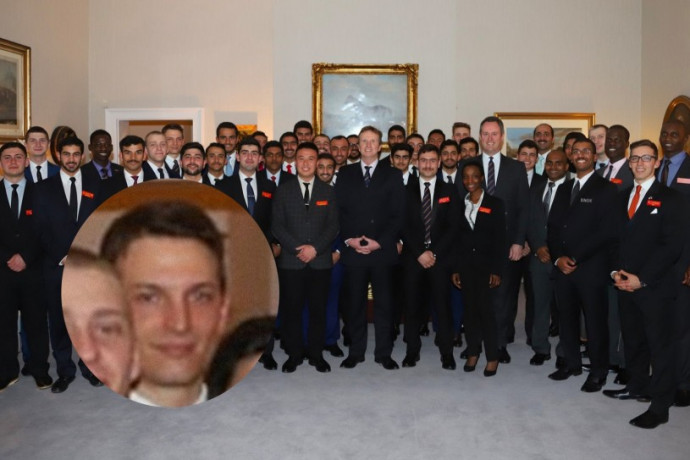
A 9-month course at the British Royal Military Academy Sandhurst can cost up to €100,000 per cadet. One of the three Hungarian officers who graduated from the elite course at the RMA Sandhurst on a Hungarian state scholarship in 2020 was Gáspár Orbán, the son of Hungarian Prime Minister Viktor Orbán. When we inquired about this at the government's online press conference, the spokesperson changed our questions, removing any mention of the PM's son.
Gáspár Orbán commenced his studies at the British elite military Academy barely two months after being sworn in as a member of the Hungarian Armed Forces. He was one of only three Hungarian soldiers to get a chance that year to complete the 9-month course with a scholarship from the Ministry of Defense, and he graduated on 11 December 2020. We know this because the Academy holds the so-called "Sovereign's Parade" for its graduates and publishes the list of their names in the Daily Telegraph. The paper's 1 January issue covered the ceremony held on 11 December, and the list includes the son of the Hungarian Prime Minister:
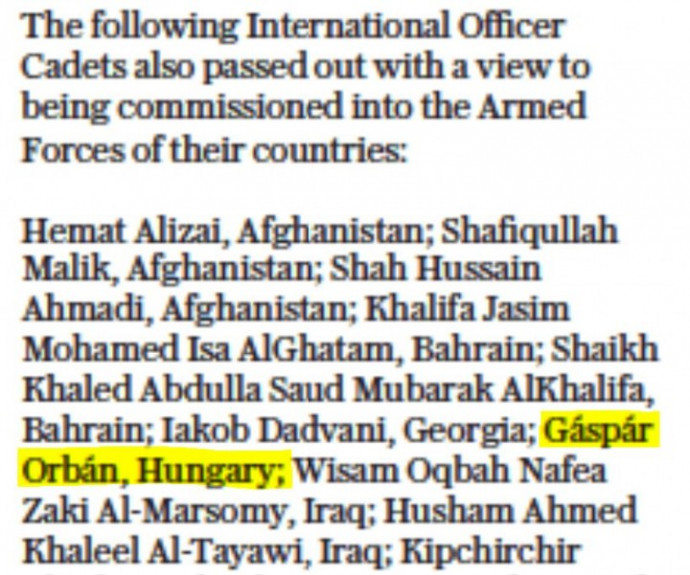
28-year-old Gáspár had started his military career in 2019 when he participated in a six-week basic training at the combat crew training group of the "vitéz Bertalan Árpád" 2nd Special Forces Brigade of the Hungarian Defence Force. He was sworn in that June, becoming a professional soldier.
Political daily Népszava first broke the story that three Hungarian citizens completed the course at Sandhurst in May 2020; the UK Ministry of Defence later confirmed this through the United Kingdom's Hungarian Embassy. Subsequently, the Hungarian Ministry of Defence also verified this, adding that the "application was open to any Hungarian soldier with the proper ambition and abilities. Participants were selected by the adjutant officer (translator's note: the officer exercising employer rights in the military) based on the integrated evaluation of the applicants' professional performance, training results, and attitude." The Ministry of Defense stated that the cost of the course at Sandhurst depends on the cadet's rank and training type.
According to the statement, all cadets had to interrupt their studies due to the coronavirus pandemic, so the three Hungarian cadets also returned home last year. This could be why Orbán only finished in December even though his studies' starting date would have suggested an earlier graduation.
We tried to reach out to the Prime Minister's son both directly and through intermediaries, but he ignored our attempts to contact him.
We have sent several inquiries to the Ministry of Defence, the Prime Minister's Office, and the Sandhurst Academy, but we are yet to receive any replies from them as well. The Hungarian Embassy of the UK only answered our questions in general terms.
Government muddies the waters
We have also sent our questions about Gáspár Orbán's state-funded education to PM Orbán's Chief of Staff Gergely Gulyás. They were exactly as follows:
“Did Gáspár Orbán receive a scholarship from the Hungarian state or the Ministry of Defence to study at the Royal Military Academy Sandhurst in the UK? If so, what is the reason for the Prime Minister's son being one of the lucky three cadets to receive such a scholarship last year? Does the Prime Minister think there could be conflict of interest concerning Hungary paying the 34 million training fee for a family member of the Prime Minister?”
However, given that the government's weekly pressers are held online due to the pandemic, we could not ask Gulyás personally on this Thursday either. Since the first wave of the coronavirus in the spring, questions from the press are read aloud by a government spokesperson, and by the time our questions made their way to Gulyás, they were eroded to this:
“We received questions from Telex concerning foreign training courses for Hungarian soldiers, and about who receive such scholarships.”
“We are not in a position to reveal personal data,” spokesperson Alexandra Szentkirályi commented, to which Gulyás quickly added:
“The data processor in question is the Ministry of Defence.”
He also explained that the Ministry already provided the information in their earlier press release that stated there were 160 Hungarian soldiers participating in training courses abroad, mostly overseas, referring to information given to state news channel M1 on Wednesday, seemingly out of the blue. This happened not long after we sent our questions to the Prime Minister's Office.
Four hours after the publication of our original Hungarian article (which preceded the weekly government presser), the Ministry of Defence issued a press release reiterating pretty much the same information, without even alluding to why sharing this data now was relevant in the first place.
Football, God, law school, military, Sandhurst
The fact that the only son of Hungarian PM Viktor Orbán (a father of five) ended up with a military career may come as a surprise to outsiders. He was preparing to be a football player, playing in the youth team of Videoton FC where he had his first official second-tier game in the autumn of 2010 as a substitute, only brought onto the pitch in the last four minutes. In 2011, Videoton drafted him as a professional. Still, he continued his career sometime later at the Puskás Football Academy, created with his father's contribution. However, he still appeared in the third-tier team of Videoton every now and again. The midfielder made his debut in the National Championship in March 2014 playing for Felcsút, brought in for the last 12 minutes against Honvéd FC when his team was losing by 4-0. A month later, a renewed injury ended his professional football career.
Gáspár travelled to Uganda with the Empower a Child Christian charity organisation that same year, teaching football to children, which is where, as he claims, he became a true believer. "I've met Jesus Christ in Africa the way that I've known him since," he later told Radio Golgota.
After returning to Hungary, he founded the Felház Christian Movement that often congregated in large events halls such as Körcsarnok and MOM Sport. "I don't think that people are that interested in someone being the son of someone in a solitary position... It is so wonderful to be a child of God; it always surprises me how interesting people find being the child of the Prime Minister," he told Index back in 2018.
Three and a half years later, Felház ceased its operation, explaining that the missionary activities started by Felház could be continued by that point without the movement itself.
During this time, Gáspár Orbán studied at the Eötvös Loránd University's Faculty of Law, finishing in 2018. But instead of a legal career, he switched over to the military, inaugurated as a soldier in summer 2019. Barely two months later, he started his elite training at the Sandhurst Academy with two of his Hungarian comrades, paid by a scholarship from the Ministry of Defence.
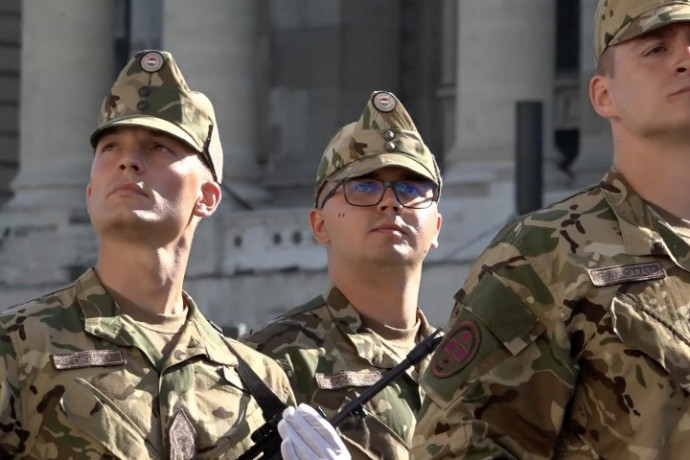
Viktor Orbán's son was only sworn in as an officer after his stint at Sandhurst had already begun, on 20 August 2020.
The alumni: Kings, princes, dictators, heads of state
The British Sandhurst Royal Military Academy, created in 1947 from the fusion of two separate institutions founded in 1801 and 1741, is not only the centre of training the British military's top brass but also a crucial tool in developing British diplomatic-military relationships. Several prominent politicians of Europe and the Middle East have completed the 44-week course at the elite military school. According to 2015 data, the cost of such education is £93,000, more than €100,000.
Henri, the Grand Duke of Luxembourg, Alois, the Hereditary Prince and Regent of Liechtenstein, Hamad, the King of Bahrain, Abdullah II, Jordanian King Abdullah II, several Sheiks, cabinet members, and emirs of Kuwait, the current Emir of Qatar, Tamim, and several Sheiks of the United Arab Emirates – these are just a few examples of the still active dignitaries who graduated from the Royal Sandhurst Military Academy in the past couple of decades.
Besides them, several former and current heads of state or dictators from various countries ranging from Brunei to Thailand, Nigeria, and Nicaragua have studied at the prestigious institution, and rumour has it that Muammar Gaddafi did so too. However, the Sandhurst Academy consistently denies that the late dictator of Lybia had ever set foot in their halls.
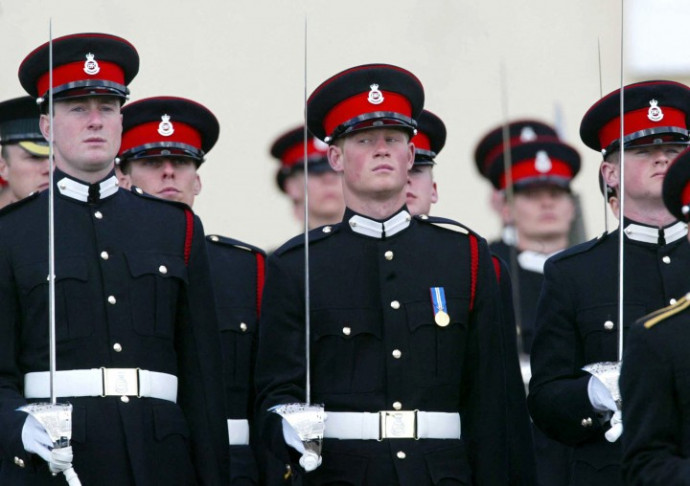
The alumni include two sons of Queen Elizabeth II, Prince William and Harry. The Academy only boasts one British Prime Minister; however, he was one of the most influential statesmen of the 20th century: Winston Churchill. Author Ian Fleming also studied there, although the creator of James Bond never graduated.
The institute mostly functions as a place of leadership training, convenient for international students, as they mostly arrive from backgrounds that determine them for political leadership – see the list above, littered with European and Middle-Eastern royalty.
The RMAS has shorter courses as well, located outside of the Academy, in 2016, for instance, two of their academics held a one-week conflict management course in Budapest. "The aim of the course was to provide the course participants with a new perspective on some key concepts in international conflict management. They also examined emerging trends and responses to crisis and conflicts, including possible responses such as prevention and intervention," the British Embassy's Facebook post informed.
Military soft power
Even though this was a significant aspect as early as the 19th century, the Academy's role in facilitating diplomatic relations gained ever more importance as the UK ceased to be a colonial power following World War II. Foreigners graduating from the RMAS usually ended up in high places in diplomacy and armed forces.
This allowed British diplomacy to negotiate with decisionmakers with whom the UK had not only official but informal relationships as well. "The King [of Bahrain] always felt that Sandhurst was a great place," Peter Sincock told the BBC. The former military diplomat, who was the British defence attache to Saudi Arabia, added that "you find people who were at Sandhurst and you have an immediate rapport. I think that's very helpful, for example, in the field of military sales."
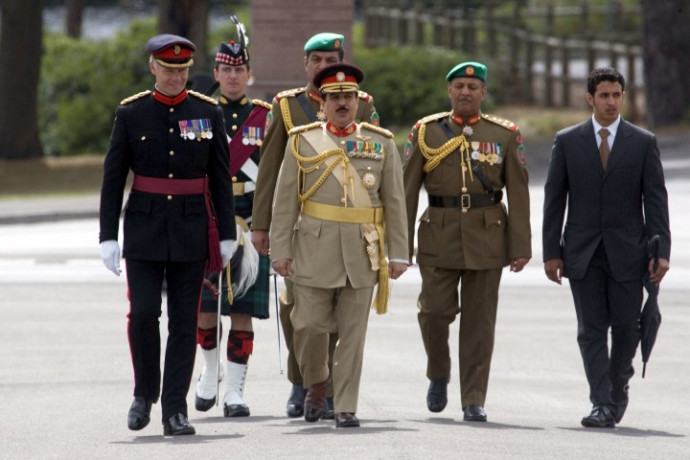
Of course, that does not immediately override everything. In 2013, David Cameron lobbied for the United Arab Emirates to purchase Typhoon fighter jets, but in vain. Still, the close – according to some commenters, uncomfortably close – relationship with the United Arab Emirates still exists. A couple of years ago, the Gulf state donated £15 million to construct the campus's new wing, which they ultimately named after the Emirates' former leader, Sheikh Zayed.
Zayed's high-profile London real estate investments can also be attributed to these links. But it could also come in handy that another RMAS graduate is Colonel Ahmed Mohammed Ali, one of the confidential advisors to Abdel Fattah Al-Sisi, the Egyptian President who removed his islamist predecessor, Mohammed Morsi, from power in 2013.
Speaking to the BBC, British Major General Arthur Denaro reminesced abot the funeral of King Hussein of Jordan, where Tony Blair saw him conversing with the sultans of Brunei and Oman, Saudi and Bahraini leaders. After giving him a surprised look, the PM asked how he knew all these people. Denaro's answer was simple: “They all went to Sandhurst."
If you wish to support free press in Hungary, please consider donating to Telex here >>>